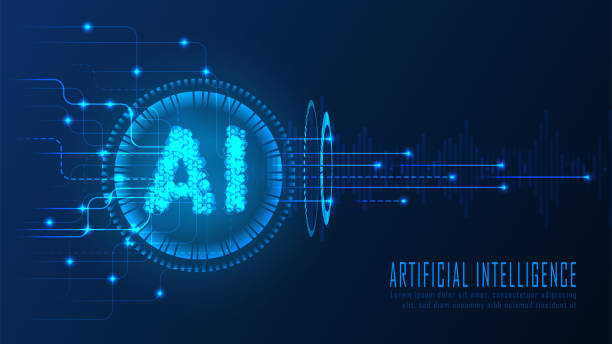What is Artificial Intelligence and what are its applications?
Artificial Intelligence (Artificial Intelligence) is a branch of computer science that deals with building machines that can perform tasks that usually require human intelligence.
These tasks include learning, problem-solving, decision-making, pattern recognition, natural language understanding, and computer vision.
In other words, the goal of #artificial_intelligence is to create systems that can think and act like humans.
The applications of artificial intelligence are very broad and have penetrated almost all industries and areas of human life.
Some of the most important applications include:
- Medicine: Disease diagnosis, drug development, robotic surgery
- Finance: Fraud detection, risk management, financial consulting
- Automotive: Self-driving cars, driver assistance systems
- Marketing: Personalized advertising, customer behavior analysis
- Education: Intelligent tutoring systems, providing educational content tailored to individual needs
- Security: Facial recognition, identifying cyber threats
Artificial intelligence is evolving and advancing, and it is expected to play a much more important role in human life in the future.
Using this technology correctly and responsibly can bring many benefits to society, but at the same time, potential challenges and risks must be considered.
Are you tired of your company’s website not meeting your expectations? With Rasaweb, design a professional website that showcases the true face of your business.
✅ Increase the attraction of new customers and sales leads
✅ Increase the credibility and trust of your brand with your audience
⚡ Get a free website design consultation!
Types of Artificial Intelligence: Approaches and Techniques
Artificial intelligence can be categorized based on various criteria.
One of the most common classifications is based on the capabilities of artificial intelligence systems.
- Narrow AI: This type of artificial intelligence can only perform a specific task.
Examples include facial recognition, playing chess, and spam detection. - General AI: This type of artificial intelligence can do anything that a human can do.
General AI is still under development and does not exist. - Super AI: This type of artificial intelligence surpasses human intelligence and can solve more complex problems.
Super AI is still a theoretical concept.
There are various approaches and techniques in artificial intelligence.
Some of the most important ones include:
- Machine Learning: Allows machines to learn from data without being explicitly programmed.
- Neural Networks: Models that are inspired by the structure of the human brain and are used to learn patterns in data.
- Natural Language Processing: Allows machines to understand and generate human language.
- Computer Vision: Allows machines to see and interpret images.
Choosing the appropriate approach and technique depends on the type of problem and the available data.
Artificial intelligence researchers are constantly developing new and more efficient methods.
Machine Learning: The Backbone of Artificial Intelligence
Machine learning (Machine Learning) is a subset of artificial intelligence that allows machines to learn from data without being explicitly programmed.
In fact, instead of writing precise instructions for each task, a machine learning algorithm learns patterns and relationships using data and makes predictions or decisions based on them.
There are different types of machine learning algorithms, each suitable for a specific type of problem:
- Supervised Learning: In this type of learning, the algorithm is trained using labeled data.
That is, for each data point, the correct answer is specified. - Unsupervised Learning: In this type of learning, the algorithm is trained using unlabeled data.
The algorithm’s goal is to find hidden patterns and structures in the data. - Reinforcement Learning: In this type of learning, the algorithm learns how to perform a task by interacting with an environment.
The algorithm receives a reward for performing the task correctly and is penalized for performing it incorrectly.
Machine learning plays a very important role in the development of artificial intelligence.
Many of the artificial intelligence applications we see today are built on machine learning algorithms.
Here is a CSS styled table that shows the types of machine learning algorithms:
| Learning Type | Description | Example |
|---|---|---|
| Supervised Learning | The algorithm is trained using labeled data. | Image recognition, price prediction |
| Unsupervised Learning | The algorithm is trained using unlabeled data. | Customer clustering, dimensionality reduction |
| Reinforcement Learning | The algorithm learns how to perform a task by interacting with an environment. | Playing games, robotics |
Click here to preview your posts with PRO themes ››
Ethics in Artificial Intelligence: Considerations and Challenges
The development and use of artificial intelligence raises important ethical considerations and challenges.
As this technology advances, we must answer the questions of how we can use artificial intelligence responsibly and ethically and prevent its misuse.
One of the most important challenges is bias in data.
If the data used to train artificial intelligence algorithms is biased, artificial intelligence systems will also be biased and may make unfair or discriminatory decisions.
Another challenge is the transparency and interpretability of artificial intelligence systems.
In many cases, it is not clear how an artificial intelligence system makes decisions, which can reduce trust in it.
Also, responsibility for the decisions of artificial intelligence systems must be considered.
If an artificial intelligence system makes a mistake, who will be responsible?
Privacy is also a major concern regarding artificial intelligence.
Artificial intelligence systems often require large amounts of personal data, which can endanger people’s privacy.
Finally, the impact of artificial intelligence on the labor market must also be considered.
With the automation of many jobs, unemployment may increase, and there will be a need for retraining and reskilling the workforce.
Do visitors to your online store leave before making a purchase? Don’t worry anymore! With Rasaweb’s professional online store website design services, solve the problem of not converting visitors into customers forever!
✅ Significant increase in conversion rate and sales
✅ Unique and attractive user experience
⚡ Contact us now to receive a free consultation!
The Future of Artificial Intelligence: Prospects and Possibilities
The future of artificial intelligence is full of exciting prospects and possibilities.
With the ever-increasing advancement of this technology, artificial intelligence is expected to play a much more important role in human life.
In the future, we will see more advanced self-driving cars, more accurate medical systems, smarter home robots, and more efficient virtual assistants.
Artificial intelligence can help solve many of the world’s major problems, including climate change, incurable diseases, and poverty.
However, the potential challenges and risks of this technology must also be considered, and it must be used responsibly and ethically.
One of the most important challenges is ensuring that artificial intelligence benefits all people and not just a select few.
Also, the impact of artificial intelligence on human identity and nature must be considered.
With the advancement of artificial intelligence, the boundary between humans and machines may become blurred, and this can raise deep philosophical questions.
Ultimately, the future of artificial intelligence depends on our decisions and actions.
If we can manage this technology correctly, it can become a powerful tool for improving human life.
Artificial Intelligence in Iran: Opportunities and Challenges
Like other countries around the world, Iran is also trying to take advantage of the opportunities of artificial intelligence.
There is a lot of potential for the development of artificial intelligence in Iran, including a specialized workforce, abundant data resources, and diverse needs in various industries.
The Iranian government also supports the development of artificial intelligence and has programs for training, research, and development in this field.
However, there are also challenges in the path of developing artificial intelligence in Iran.
One of the most important challenges is the lack of necessary investment and infrastructure.
Also, there is a need to train a specialized and efficient workforce in this field.
Another challenge is issues related to privacy and data security.
To succeed in developing artificial intelligence in Iran, cooperation between the government, universities, and the private sector is needed.
By investing in training, research, and development, the necessary infrastructure must be provided, and a specialized workforce must be trained.
Also, by developing appropriate laws and regulations, privacy and data security must be protected.
Click here to preview your posts with PRO themes ››
Applications of Artificial Intelligence in Everyday Life
Artificial intelligence has increasingly penetrated our everyday lives, often in ways we may not even realize.
From recommendation systems on video streaming platforms to virtual assistants on our smartphones, artificial intelligence has improved many aspects of our lives.
Other examples of artificial intelligence applications in everyday life include:
- Spam filters: Artificial intelligence algorithms identify and filter unwanted emails.
- Navigation systems: Programs like Google Maps use artificial intelligence to find the best route and predict arrival times.
- Machine translation: Tools like Google Translate use artificial intelligence to translate languages.
- Voice recognition: Systems like Siri and Alexa use artificial intelligence to recognize and respond to voice commands.
These are just a few examples of artificial intelligence applications in our everyday lives.
As this technology advances, artificial intelligence is expected to play a much more important role in our lives.
| Feature | Traditional Methods | Artificial Intelligence-Based Methods |
|---|---|---|
| Accuracy | Usually lower | Usually higher |
| Speed | May be slow | Usually fast |
| Cost | May be high | May be lower |
| Adaptability | Limited | More |
How Artificial Intelligence Learns
Understanding how artificial intelligence learns is essential to understanding its potential and limitations.
At the heart of artificial intelligence learning are algorithms designed to analyze data, identify patterns, and make predictions.
By being exposed to large amounts of data, these algorithms gradually improve their ability to perform specific tasks.
The artificial intelligence learning process typically involves the following steps:
- Data Collection: Data related to the problem is collected.
- Data Preparation: Data is cleaned, organized, and formatted.
- Algorithm Selection: The appropriate algorithm is selected based on the type of problem and data.
- Algorithm Training: The algorithm is trained using the data.
- Performance Evaluation: The algorithm’s performance is evaluated, and adjustments are made as needed.
There are different types of artificial intelligence learning algorithms, each suitable for a specific type of problem.
Some of the most common algorithms include neural networks, decision trees, and support vector machines.
Are you dissatisfied with the low rate of converting visitors to customers on your online store website?
Solve this problem forever with professional online store website design by Rasaweb!
✅ Increase the rate of converting visitors to customers
✅ Create an excellent user experience and build customer trust
⚡ Get a free consultation
Key Concepts in Artificial Intelligence
To better understand artificial intelligence, it is essential to be familiar with some of its key concepts:
- Algorithm: A set of instructions designed to solve a problem or perform a specific task.
- Data: Information that is used to train artificial intelligence algorithms.
- Model: A representation of knowledge that has been created by a machine learning algorithm.
- Feature: A measurable property of an object or event.
- Prediction: An estimate of an outcome based on data and a model.
These concepts are the building blocks of artificial intelligence, and understanding them is essential to understanding how artificial intelligence systems work.
Also Machine Learning and Deep learning are important in AI
Job Opportunities in the Field of Artificial Intelligence
With the growth and development of artificial intelligence, many job opportunities have been created in this field.
Companies and organizations are looking for specialists who can design, develop, and implement artificial intelligence systems.
Some of the most common job opportunities in the field of artificial intelligence include:
- Machine Learning Engineer: Responsible for designing and developing machine learning algorithms.
- Data Scientist: Responsible for collecting, analyzing, and interpreting data to solve business problems.
- AI Engineer: Responsible for designing and developing artificial intelligence systems.
- AI Researcher: Responsible for conducting research in the field of artificial intelligence.
To enter the field of artificial intelligence, you need to have strong technical knowledge and skills in the fields of computer science, mathematics, and statistics.
Also, you must have the ability to learn continuously and solve complex problems.
Click here to preview your posts with PRO themes ››
FAQ
| Question | Answer |
|---|---|
| 1. What is Artificial Intelligence (AI)? | It is a branch of computer science that aims to create machines capable of simulating human intelligence and performing tasks that require human thinking, such as learning, problem-solving, and decision-making. |
| 2. What are the main types of artificial intelligence? | They can be classified into weak artificial intelligence (Narrow AI), which focuses on a specific task, general artificial intelligence (General AI), which possesses comprehensive human capabilities, and super artificial intelligence (Super AI), which surpasses human intelligence. |
| 3. Mention some common applications of artificial intelligence in our daily lives. | These include voice assistants (such as Siri and Alexa), recommendation systems (such as Netflix and Amazon), self-driving cars, facial recognition systems, and spam filters. |
| 4. What is the difference between Artificial Intelligence and Machine Learning? | Artificial intelligence is the broader concept of creating intelligent machines, while machine learning is a subset of artificial intelligence that focuses on enabling systems to learn from data without explicit programming. |
| 5. What is Deep Learning? | It is a subset of machine learning that uses multilayer artificial neural networks (deep neural networks) to process data and discover complex patterns, and it is used in image and speech recognition. |
| 6. What are the most prominent benefits of artificial intelligence? | Improving efficiency and productivity, automating repetitive tasks, making better decisions based on big data analysis, and developing solutions to complex problems in areas such as medicine and science. |
| 7. What are the main challenges facing the development and deployment of artificial intelligence? | These include the need for massive amounts of high-quality data, privacy and security issues, bias in data and algorithms, and high development and maintenance costs. |
| 8. Does artificial intelligence raise ethical or social concerns? | Yes, it raises concerns related to privacy, algorithmic bias, job losses due to automation, responsibility for errors made by intelligent systems, and the need for a regulatory framework. |
| 9. How can artificial intelligence affect the future of the labor market? | It may lead to the automation of some routine jobs, but it will also create new jobs that require advanced skills in developing, operating, and maintaining artificial intelligence systems. |
| 10. What are some modern or promising technologies in the field of artificial intelligence? | These include advanced natural language processing (NLP) (such as large language models like ChatGPT), computer vision, robotics, and generative AI. |
Other services of Rasa Web Advertising Agency in the field of advertising
Smart Social Media: A professional solution for attracting customers with a focus on precise audience targeting.
Smart Custom Software: A combination of creativity and technology for analyzing customer behavior by optimizing key pages.
Smart Sales Automation: A fast and efficient solution to increase click-through rates by focusing on attractive user interface design.
Smart SEO: Designed for businesses looking for digital branding through Google Ads management.
Smart Marketing Automation: A dedicated service for growing digital branding based on optimizing key pages.
And more than hundreds of other services in the field of internet advertising, advertising consulting, and organizational solutions
Internet Advertising | Advertising Strategy | Advertorial
Resources
What is Artificial Intelligence and How Does It Work?
,What is Artificial Intelligence? — In Simple Language
,What is Artificial Intelligence? Its Applications, Advantages, and Disadvantages
,What is Artificial Intelligence (AI)?
? To boost your business in the digital world, Rasaweb Digital Marketing Agency, specializing in responsive website design and providing comprehensive digital marketing solutions, is always with you to reach the peak of success.
📍 Tehran, Mirdamad Street, next to the Central Bank, Southern Kazerun Alley, Ramin Alley, No. 6















